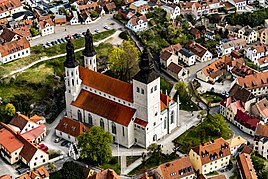Visby
Böi or Böin (Gutnish) | |
|---|---|
Clockwise from top: the Visby Cathedral; ruins of the Saint Nicolai Church; Almedalen | |
| Nickname: City of roses | |
| Coordinates: 57°38′05″N 18°17′57″E / 57.63472°N 18.29917°E | |
| Country | |
| Province | |
| County | Gotland County |
| Municipality | Gotland Municipality |
| Charter | 1645 |
| Area | |
• Locality | 12.44 km2 (4.80 sq mi) |
| Population (31 December 2017)[2] | |
• Locality | 24,330 |
| • Density | 1,816/km2 (4,700/sq mi) |
| • Metro | 58,003 |
| Time zone | UTC+1 (CET) |
| • Summer (DST) | UTC+2 (CEST) |
| Postal code | 621 xx |
| Area code | (+46) 498 |
| Website | www |
| Official name | Hanseatic Town of Visby |
| Criteria | Cultural: iv, v |
| Reference | 731 |
| Inscription | 1995 (19th Session) |
Visby (Swedish: [ˈvǐːsbʏ] ) is an urban area in Sweden and the seat of Gotland Municipality in Gotland County on the island of Gotland with 24,330 inhabitants as of 2017[update].[2] Visby is also the episcopal see for the Diocese of Visby. The Hanseatic city of Visby is arguably the best-preserved medieval city in Scandinavia, and, since 1995, it has been on the UNESCO World Heritage Site list.[3] Among the most notable historical remains are the 3.4 km (2.1 mi) long town wall that encircles the town center, and a number of church ruins. The decline as a Hanseatic city in the Late Middle Ages was the cause for many stone houses being preserved in their original medieval style.
Visby is a popular vacation destination for Scandinavians during the summer and receives thousands of tourists every year. It is by far the most populous Swedish locality outside the Swedish mainland. The Gotland University is in Visby, and since 1 July 2013, it is a department of Uppsala University under the name Uppsala University–Campus Gotland. Visby is also the sole county seat in Sweden accessible from the mainland only by boat and air.
Important annual events held in Visby include the annual political forum Almedalen Week.
- ^ "Tätorternas landareal, folkmängd och invånare per km2 2005 och 2010" (in Swedish). Statistics Sweden. 14 December 2011. Archived from the original on 27 January 2012. Retrieved 10 January 2012.
- ^ a b "Gotland i siffror, pdf". www.gotland.se. Region Gotland. p. 65. Retrieved 8 March 2018.
- ^ "21 World Heritage Sites you have probably never heard of". Daily Telegraph. Archived from the original on 12 January 2022.






